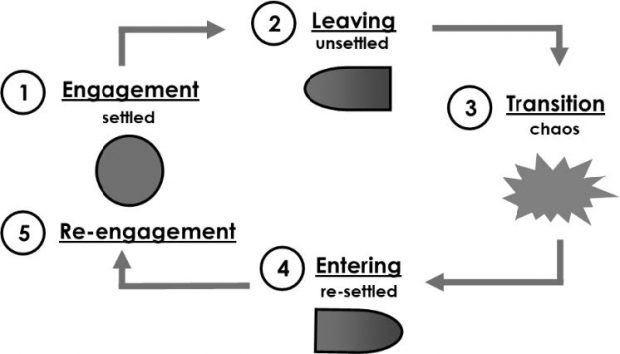Article: The Educational Transitional Experience
Revised from an article by Dr. Brenda Dickey
Transitional Model

The success of the educational transitional experience for your child depends on family support and each child’s developmental stage. The stages of transition are described in Dave Pollock’s book Third Culture Kids. TCKs will go through these stages as they face any type of life transition: engagement, leaving, transition, entering, and re-engagement. These phases are impacted by the stage of development of the child at the time of the transition. (See Transition Model.)
Leaving
Parents need to discuss openly their own feelings of sadness with their children about leaving a place that is comfortable and “known.” You should also discuss how your close family/friend relationships will change during and after the transition.
Transition and Entering
Parents should help children focus on making new friendships as quickly as possible. This can be done by intentionally planning a time for children and youth to play games with others and their families or planning an outing together. It is worth the time and cost involved to let children say goodbye to known relationships and take time to develop new ones.
Reengagement
Settle in a routine of school, church, and community. Extracurricular activities are good for this time (swimming teams, ball teams, art and music, etc.). This is especially important during middle and high school adolescent development years. Providing daily family routines and time with supportive relationships can encourage smoother transitions. Parents can use literature to help the transition by reading to their children about other kids who have experienced new transitions. These things can help ease the difficulty of transitions for children and provide opportunity for discussions.
Some helpful literature is provided in the great resource book, The New Kid in School, by Debra Rader and Linda Harris Sittig. It provides insight for teachers and parents to use in educational transitions. Here are several other titles suggested by Interact magazine:
- Alexander, Who’s Not (Do You Hear Me? I Mean It!) Going to Move by Judith Viorst, Ray Cruz, Robin Preiss Glasser
- Ira Says Goodbye by Bernard Waber
- When Africa Was Home by Karen Lynn Williams and Floyd Cooper
- Tea with Milk by Allen Say
There are also a couple of myths families need to address during transition.
Myth 1—Children will be impacted negatively by transitions; therefore, we need to avoid all transitional experiences.
No! Transitions are a part of life. Those who learn to navigate well during each transition re-engage quickly toward positive life experiences.
Myth 2—Children are so resilient that they will find a way to bounce back during all transitions without parental or others intentionally planning for positive engagement experiences.
No! Resiliency skills are taught by intentional planning, supportive modeling of friendship building, and coaching by parents and/or others who are significant to the child in the environment.
The goal is for children to move as quickly as possible from the leaving stage to the re-engagement stage of transition in order to minimize any negative impact on behavior.
These are excellent opportunities for TCKs to receive a comprehensive evaluation/summary of the various dynamics they will encounter as they adjust to the U.S. upon graduation from high school. These seminars fill up quick. Make sure you register by February 1 for that year’s seminar.
Resources Connection
Interaction International
Barnabas International and Narramore Christian Foundation
www.barnabas.org/member-care/events/mk-transitional-seminar
Additional TCK Education Resources
The following items are available through the TCK office via your (00) account. There is a limit of one (1) of each item per family unit. Additional copies must be purchased as a personal expense. Contact TCKIEducation@gmail.com to request a resource.
- Third Culture Kids by Pollock and Van Reken ($20). The experience of growing up among worlds.
- Raising Resilient TCKs, published by ACSI, edited by Joyce M. Bowers (free download). Resources for caregivers, parents, and teachers.
- Fitted Pieces, published by SHARE Education Services, edited by Janet R. Blomberg and David F. Brooks ($18). A guide for parents educating children overseas.
Article: TCK Educational Transitional Years
Revised from an article by Dr. Brenda Dickey
Preparing TCKs for educational transitions is an important part of the educational process when considering moving, especially around the world. It will help your child’s transition if you have a long-range educational plan in place (see Making an Education Plan at the beginning of this resource).
You want your child to have a positive and successful school experience. The information below is intended to assist you in preparing your child when planning an educational transition experience. The information is broken into developmental stages with information about what a child is normally learning during that education stage and how to help your child if you are transitioning overseas or back to the U.S. during one of these stages.
Early Elementary Years (Grades K–5)
These years are packed with learning to read, write, and establish math conceptualization for later learning success. During this time, developing a strong reading base in the student’s first language is the foundation for successful learning in later developmental years. Writing development and a strong math foundation are also extremely important.
This is the time that children learn to love culture and languages. Play time, interaction with cultural groups, and extracurricular activities (music, art, sports) provide the best opportunities for learning languages and enjoying culture. Language development takes place naturally during these early years.
It is important to plan in advance when you know your child will be transitioning to a new or different type of school. Your child’s portfolio (see details on creating a portfolio) will provide good information to help a new school place your child.
Middle School Years (Grades 6–8)
These years are critical for identity development. Activities including music, art, and sports should encourage strong friendships that help build personal identity.
Also, during this time, students tend to want to identify with their first language culture. It cannot be stressed enough how important family involvement is during these years to help children develop healthy identities. It is also important to use this time to teach the history and culture of the passport culture along with encouraging long-distance family ties. This can be done while you are overseas, but it is important that these things do take place during these years. If this stage occurs during itineration, there are many opportunities to build a church “family” support via strong youth groups and children’s programs.
High School Years (Grades 9–12)
Academic credits are important during these years, so it is critical to plan appropriately. It is important to complete a full year of high school before transitioning to another school setting so that the student will receive full credit for course work completed instead of half credits. Some schools may offer the same subjects, but divide the semesters differently. This could affect the number of credits awarded for a class. Completing a full year of high school before transitioning will help avoid credit loss.
When considering a school transition, it is important to remember that every school may require different subjects to be completed before graduation. The parent and student should investigate the necessary graduation requirements for a particular school that the student may attend.
AP courses and Honors courses are good choices for students who want to attend university. These are rigorous classes that prepare the student for university level work.
If you are required to make a transition in the middle of a school year, be sure to keep important information from your child’s school (name of school, contact info, report cards, etc.), as well as your child’s portfolio (see section on creating a portfolio).
High school is also the time to begin preparing your TCK for their transition to college and adult life. (See College Preparation for more details.) Encourage your high school child to reconnect with family in the U.S., especially if they choose to attend a college located near family members.
Remember that your child’s success through transition partly depends on your support and helping him/her prepare for that transition. The TCKI office is available to offer suggestions and helps if your child is struggling with transition.
Article: Practical Parenting through the Educational Process
Revised from an article by Dr. Brenda Dickey
Your TCK needs your support through the education process. Research shows that a good social support system at home and school is an important key for educational success.
You may assume that if your child attends a good school and works hard their hard work will be enough to achieve academic success. Your home is a very important source of support. That includes your guidance in creating positive social opportunities.
It is important to understand how your TCK perceives your family support system. For instance, TCKs may perceive support in terms of time spent together and listening to their concerns. When you are busy and do not have daily listening time for your student, support for their educational and emotional needs may suffer. This is especially true when your TCK translates time with you, as a measure of caring.
If your student begins to develop a lack of interest in school, shows negative behavior or withdraws from normal activities, there may be a need for some special attention. Consistent daily interaction is important to the educational success of your TCK.
When a student experiences stress in the school environment, they may need your listening ear. Students often want to talk about their experiences as they process what they are learning. Families who play and spend time together from an early age stay strong when their children go through stressful situations at school. Be willing to adjust your schedule and add or eliminate extra activities to help your child when he/she is struggling. Keep open communication with your child and allow him/her to talk with you about struggles they may be facing.
If you suspect your child’s struggles are related to a learning disability, please feel free to contact the TCK Office. There are education specialists and resources available for testing and helps if needed.
Help your TCK understand the gifts and abilities the Father has created in them. Provide opportunities to improve those gifts. Do your best to find activities to help your child grow. Encourage them to stretch and improve their skills outside of the classroom. Look for activities like swimming, soccer, baseball, music, and art that your child can participate in and learn to grow.
Keeping open communication, spending regular time together, and playing together as a family will help your TCKs stay strong educationally and emotionally. Your work is critical and can sometimes be stressful, but if you pour into your children they will succeed in school and learn to handle transition and change well.
